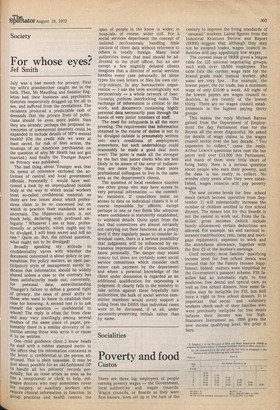Socialities
Poverty and food
Custos
There are three big employers of people earning poverty wages — the Government, local authorities and wages councils. Wages councils, or Boards as their were first known, were set up at the turn of the century to improve the living standards of ' sweated' workers. Latest figures from the Industrial Relations Review and Report (IRRR) suggest that, although they may not be sweated trades, wages council industries still pay appallingly low wages.
The current issue of IRRR gives a league table for 125 national negotiating groups, each with over 10,000 employees. The table lists the current wage rate for the lowest grade male manual worker, arid some are very low. For example, the lowest payer, the fur trade, has a minimum wage of only £10.90 a week. All eight of the lowest payers are wages council industries, as are twenty of the lowest thirty. There are no wages council establishments in the highest paying thirty groups.
This makes the reply Michael Barnes gained from the Department of Employ ment the day Parliament rose for the Recess all the more disgraceful. He asked for details of wage claims in the wages council sector over the last decade. "Too expensive to collect," came the reply. Arthur Lewis's questions have cost the tax payer well over £13,000 this Parliament, and many of them were little short of being batty. Here is a serious question about people who earn their poverty, and the data is too costly to collect. No wonder sixty years after they were established, wages councils still pay poverty wages.
The new income levels for free school meals (which become operative from Sep tember 1) will substantially increase the number of children entitled to free school dinners. The means test for this benefit is not the easiest to work out. From the fa milies' gross incomes (which include family allowances) certain deductions are allowed. For example, tax and national insurance contributions, rent, rates and mortgage repayments, expenses to work and the attendance allowance, together with the first £2 of the mother's earnings.
Until recently, most families' qualifying income level for free school meals was around that for the Family Income Supp lement. Indeed, matters were simplified by the Government's passport scheme. FIS fa milies had an automatic right to free medicine, free dental and optical care, as well as free school dinners. Now some fa milies may be ineligible for FIS, but still have a right to free school dinners. It is important that social and voluntary workers check each of their families who were previously ineligible for free meals befause their income was too high.
Statutory Instrument no. 1098 gives the new income qualifying level. We print It here.
































 Previous page
Previous page